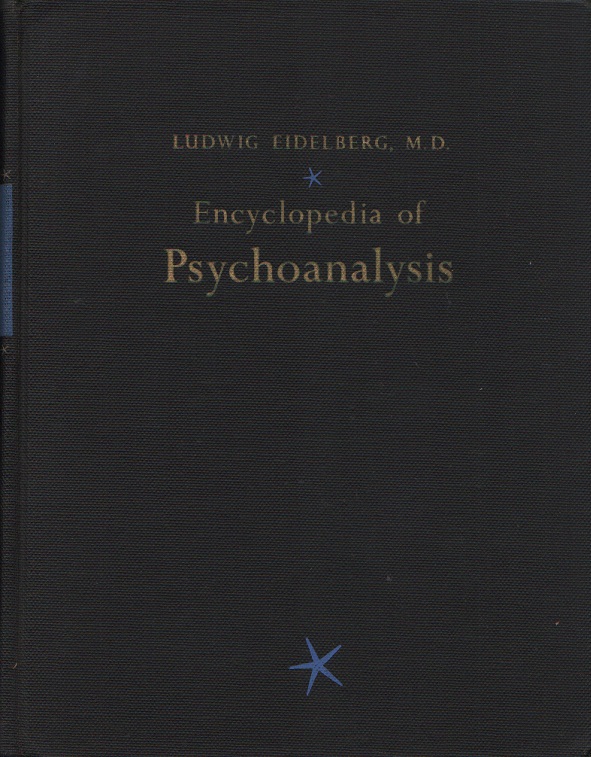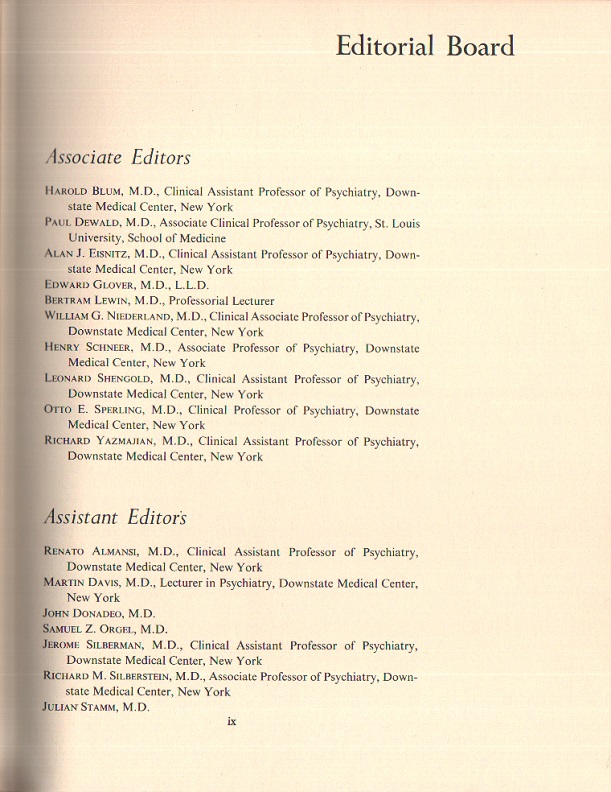Details
| Herausgeber | Eidelberg, Ludwig (1898-1970) (Hg.) |
|---|---|
| Verlag | The Free Press |
| Auflage/ Erscheinungsjahr | 1968, EA (First Printing) |
| Format | 25,4 × 19,8 × 5,3 cm |
| Einbandart/ Medium/ Ausstattung | OLwd. mit geprägtem Titel |
| Seiten/ Spieldauer | XXXVII, 571 Seiten |
| SFB Artikelnummer (SFB_ID) | SFB-007248_AQ |
"The terms, concepts, and biographical data relevant to the understanding of Freudian psychoanalysis" (L.E.)
Aus der Einleitung des Herausgebers
Introduction
"Freud created the science of psychoanalysis he and his pupils introduced many scientific terms which initially were defined only vaguely. Later, many new terms, including alterations in old ones, were instituted and concepts borrowed from other sciences or from the common language were altered but never properly redefined. Contributions from many different languages made consistent translation a problem. As well, the terms and concepts of psychoanalysis (or any science), reflecting a dynamic development, were subjected to conflicting interpretations. It is our belief that the proper delineation of psychoanalytic terminology will markedly decrease the misunderstandings that presently exist, misconceptions which seriously complicate the activity of those who report what they discover, criticize what they are taught, and examine the data they receive from their colleagues.
We knew in advance that we would not succeed in assembling all the terms employed in psychoanalysis. Equally, it was to be expected that not all our colleagues would agree with the interpretations that have been rendered. In spite of this and other difficulties, it seemed to us that the need for a psychoanalytic encyclopedia was so great that it was only proper to proceed.* The reader, we agree, will inevitably notice the absence of some definitions, and he will find others to be controversial. In our opinion, it is our warrant to present a controversial interpretation, where the term has been properly defined, in order to provoke discussion that can lead to the detection and correction of errors.
We have not limited ourselves to the terminology used only by a majority of psychoanalysts, for scientific problems are not solved by a vote or ex cathedra decisions. A term which is not presently in wide usage may become so in the near future. Nonetheless, terms which are duplications of older ones probably should be eliminated. It also seems proper to overlook those terms which are used in a manner contradictory to the basic laws of methodology.
We have decided to include not only such analytical terms as negation and sublimation but more general terms as well, such as envy, jealousy and love. Where an adequate general description of the term can be found in a standard dictionary, we have confined ourselves to the psychological significance of the term. Where this is not the case, a more general exploration of the term has been undertaken to bridge the gap between its common English usage and its psychoanalytic meaning. We should also like to point out that a suggested usage is advanced only to help eliminate an existing semantic misunderstanding. For reasons of accuracy, those quotations which are advanced in support of an interpretation are rendered as they appear in the original (or its translation). This latter circumstance has led to the inclusion of some syntactical differences (e.g. U.S. vs. English spelling). In this, we can only plead the cause of scholarship and point out that elsewhere American usage predominates.
While it is obvious that the interpretations offered in this encyclopedia are the result of a joint effort put forth by all its editors, it seems only fair to suggest that its editor-in-chief be blamed for whatever errors there are that have gone undetected. Finally, we have all tried to abide by Freud's dictum: We have made up our minds to simplify nothing and to hide nothing. If we cannot see things clearly we will at least see clearly what the obscurities are. I would not have succeeded in this effort if it were not for the assistance of Dr. Charles Kaufman who was instrumental in helping me obtain a generous grant from the National Institute of Mental Health. I should also like to thank Dr. Sandor Lorand and Dr. Mortimer Ostow for their valuable contributions. I wish especially to thank Mr. Meyer M. Marvald, the Executive Officer of the Downstate Medical Center, Psychiatry Department, for his devoted assistance and his enthusiastic support. To my wife, Marthe, I extend my great appreciation for her six-year editorial labors. I also extend my thanks to Mr. Lee Jacobson and to my Executive Secretary, Miss Michele Robbins, for her assistance. Finally, I wish to draw your attention to the herculean efforts of two men, Mr. James Strachey and Dr. Alexander Grinstein, whose efforts in the preparation of their respective works, The Complete Psychological Works of Sigmund Freud and The Index of Psychoanalytic Writings, have made measurably easier the writing of this present volume."
LUDWIG ElDELBERG, M.D.
Stimmen zu diesem Werk
"This huge book contains 643 entries, a 1,500 title bibliography and a 6,000 item index. It is a tremendous collection of definitions, explanations, and discussions. Although it will not suffice for the student in psychoanalytic training it is a good reference for students and practitioners of psychiatry. Eidelberg's prologue is a well meaning but a somewhat out of place plea for greater liberality and democratization of the psychoanalytic "Establishment." This is a worth while addition to psychiatric libraries."
Roy R. Grinker, in: JAMA Network
Der Autor
Ludwig Eidelberg (geboren 27. Dezember 1898 in Złoczów, Österreich-Ungarn; gestorben 13. November 1970 in New York City) war ein österreichisch-US-amerikanischer Psychoanalytiker.
Leben:Ludwig Eidelbergs Vater Ihamar Eidelberg war Rechtsanwalt in Złoczów. Ludwigs Geschwister Sigmund und Stephanie wurden Opfer des Holocaust. Eidelberg besuchte nach Ausbruch des Ersten Weltkriegs das Gymnasium in Wien und leistete nach der Matura ab 1916 den Kriegsdienst. Ab 1918 studierte er Medizin in Wien und wurde 1925 promoviert. 1924 heiratete er die aus Budapest stammende Paula Huttner, die bereits 1938 starb.
Von 1925 bis 1932 arbeitete er an der Universitätsklinik für Psychiatrie und Neurologie bei Julius Wagner-Jauregg und dessen Nachfolger Otto Pötzl, der allerdings bereits 1930 der NSDAP beitrat. Seit 1932 arbeitete er im neurologischen Ambulatorium der Arbeiterkrankenkasse. 1928 wurde er außerordentliches und 1933 ordentliches Mitglied der Wiener Psychoanalytischen Vereinigung. Eine Lehranalyse absolvierte er bei Ruth Mack Brunswick. Er eröffnete eine psychoanalytische Praxis in Wien. Eidelberg war ein Fußballfan, was die bürgerlichen Berufskollegen als „kulturlos“ kritisierten.
Nach dem Anschluss Österreichs 1938 emigrierte Eidelberg nach Frankreich und flüchtete 1939 mit seiner zweiten Frau, die aus Basel stammende Marthe Elkmann, und deren Sohn Philippe nach England. Dort ermöglichte ihm die British Psychoanalytical Society die Arbeit in Oxford. 1940 wurde er als feindlicher Ausländer ausgewiesen und konnte in die USA einreisen, wo er eine Praxis eröffnen durfte.
Eidelberg wurde Mitglied der New York Psychoanalytical Society und konnte ab 1942 in der psychiatrischen Abteilung des Mount Sinai Hospital arbeiten. Ab 1943 arbeitete er außerdem am New York Psychoanalytic Institute und ab 1958 am Kings County Hospital Center. Er erhielt eine Professur am New York Downtown Hospital und war 1959 Präsident der New York Psychoanalytical Society.
Schriften (Auswahl)
- Studies in psychoanalysis. New York : International Universities Press, 1948
- Take off your mask. New York : Pyramid Books 1948
- Das Gesicht hinter der Maske : Arbeitstag eines Psychoanalytikers. Deutsch von Gertrud Hübner. Stuttgart : Hippokrates-Verlag, 1948
- The dark urge. New York : Pyramid Books, 1961
- (Hrsg.): Encyclopedia of psychoanalysis. New York : Free Press, 1968
Sekundärliteratur
- Elke Mühlleitner: Eidelberg, Ludwig, in: Biographisches Lexikon der Psychoanalyse. Die Mitglieder der Psychologischen Mittwoch-Gesellschaft und der Wiener Psychoanalytischen Vereinigung 1902–1938. Tübingen: Edition Diskord, 1992, ISBN 3-89295-557-3, S. 80f.
- Eidelberg, Ludwig, in: Susanne Blumesberger, Michael Doppelhofer, Gabriele Mauthe (Bearb.): Handbuch österreichischer Autorinnen und Autoren jüdischer Herkunft. 18. bis 20. Jahrhundert, Hg. Österr. Nationalbibliothek, Saur, München 2002 ISBN 3-598-11545-8, Eintrag 906, S. 259
- Werner Röder, Herbert A. Strauss: Biographisches Handbuch der deutschsprachigen Emigration nach 1933 / International Biographical Dictionary of Central European Emigrés 1933–1945, Vol II, 1 München: Saur 1983 ISBN 3-598-10089-2, S. 245
- Rolf Lindhorst: Leben und Werk von Ludwig Eidelberg. Mainz, Univ. : Medizin, Diss., 1975
(Quelle: Wikipedia)
Zum Erhaltungszustand
Seltene Erstausgabe dieses umfassenden Handbuchs zur Psychoanalyse in einem gut bis sehr guten Erhaltungszustand.


Kommentare
Schreiben Sie den ersten Kommentar!
Neuer Kommentar
Bitte beachten Sie vor Nutzung unserer Kommentarfunktion auch die Datenschutzerklärung.